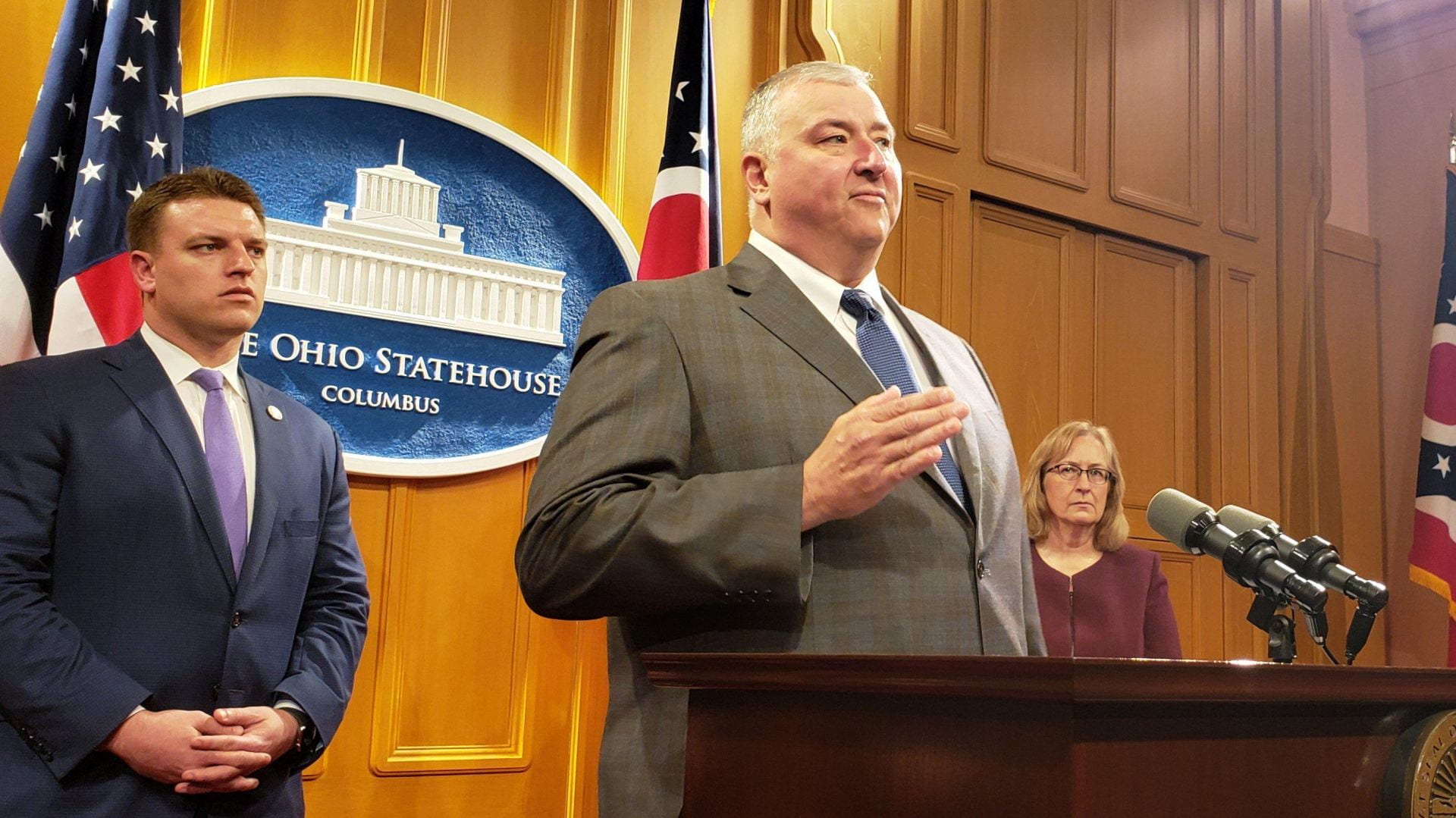
Ohio House Speaker Larry Householder was arrested Tuesday following an FBI investigation into him taking bribes to get House Bill 6 passed. Credit: Courtesy of TNS
Quid pro quo and $61 million in bribes.
Larry Householder, Ohio speaker of the house, was arrested Tuesday morning on multiple counts of racketeering, bribery and other crimes, along with four other individuals, including Ohio State alumni Matthew Borges and Juan Cespedes in one of the largest money laundering schemes in Ohio. Householder’s arrest marks the first time in a decade an Ohio house speaker was charged and arrested by the FBI and the first time a public official in the southern district of Ohio was charged with racketeering.
“Make no mistake, these allegations are bribery, pure and simple. This was a quid pro quo, this was pay-to-play,” U.S. Attorney General for the Southern District of Ohio David DeVillers said in a press conference Tuesday.
Householder and associates created 501(c)(4) Generation Now in order to funnel money toward passing House Bill 6, a subsidy that supported Ohio nuclear energy operations through a monthly charge on Ohioans’ energy bills and has been described as a $1.5 billion bailout for the energy sector. 501(c)(4) organizations are tax-exempt social welfare programs that are not required to disclose donors. In addition to being prohibited from financially benefiting a shareholder, 501(c)(4) organizations cannot primarily operate as a political entity or intervene in political campaigns on behalf or against a candidate, DeVillers said.
DeVillers said Generation Now was created solely to get H.B. 6 passed by the Ohio legislature and to keep it from being recalled by petition. In addition, he said Householder and his associates received at least $61 million through the organization to their personal benefit.
Others who were charged in the racketeering scheme were Household’s adviser Jeffrey Longstreth and statehouse lobbyist Neil Clark, according to the criminal complaint unsealed Tuesday. All five charged have connections with First Energy, an energy company that benefited from the passing of H.B. 6.
In the criminal complaint, the company that was the only donor to Generation Now was not named, but referred to as “Company A.” DeVillers would not comment on whether “Company A” was First Energy, but said, “everyone in this room knows who ‘Company A’ is.”

Cooling towers at the Perry nuclear power plant in Lake County, Ohio. The Perry plant, along with Davis-Besse plant, received bailouts from H.B. 6. Credit: John Kuntz/The Plain Dealer via TNS
Householder personally benefited through the organization, the lawsuit alleges. At least $300,000 went to legal fees and settlements for a lawsuit against Householder, more than $100,000 went toward his home in Florida, and $97,000 were used to pay expenses associated with his 2018 campaign.
Borges graduated from Ohio State in 1994 with a degree in political science and was awarded in 2019 a distinguished alumnus award by the department of political science. University spokesperson Ben Johnson said Borges is currently on the advisory board for the political science department and that the university had no further comment on the investigation.
In 2001, Cespedes, as Ohio State’s Undergraduate Student Government Vice President, used money in the discretionary fund to sign checks that paid for the chief-of-staff’s stipend. According to Lantern reporting, many in USG viewed this as unethical and led to an investigation from the office of the Vice President of Student Affairs, the result of which is unknown. He also used discretionary funds to pay for an expensive dinner at a steak house in Columbus.
Cespedes resigned in February 2001 from the vice presidency
Borges, a registered lobbyist for a subsidiary of “Company A,” is alleged to be at the center of the effort to stop the ballot referendum to end H.B. 6. In August 2019, shortly after the referendum was announced, Borges created a consulting group which would receive $1.62 million originally from “Company A” into its primary account over four months, the lawsuit alleges.
Borges is alleged to have paid himself $350,000 and Cespedes $600,000 from the account.
Cespedes is alleged to have received a total of $827,000, including the amount from Borges, in money originally from “Company A.” The lawsuit alleges that Cespedes was retained by the same subsidiary of “Company A” for which Borges worked to pursue the bailout legislation in spring 2018.
The lawsuit also alleges that Cespedes was in regular contact with “Company A” while tracking householder-backed candidates that received money originally from Generation Now and coordinated a $15 million payment from “Company A” to Generation Now.
Longstreth, described by Clark as Householder’s “implementer,” is a signatory on Generation Now’s bank accounts and is accused of transferring money from those accounts to other entities. Longstreth also ran Householder’s campaign and led the media efforts to pass H.B. 6.
Longstreth is also accused of transferring more than $10.5 million from Generation Now to JPL & Associates, the company he owns and operates. He is alleged to have personally received more than $5 million in funds originally from “Company A.”
Clark, owner and operator of Ohio-based lobbying firm Grant Street Consultants and former budget director of the Ohio Senate Republican Caucus, described himself as one of Householder’s “closest advisors” and served as Householder’s proxy in the H.B. 6 enactment efforts, the lawsuit alleges. The lawsuit states that Clark also described himself as Householder’s “hit man” who would do the “dirty” work.
Clark is alleged of personally receiving $290,000 originally from “Company A.”
In a press release Tuesday, Gov. Mike DeWine called for Householder’s resignation.
“Because of the nature of these charges, it will be impossible for Speaker Householder to effectively lead the Ohio House of Representatives,” DeWine said. “This is a sad day for Ohio.”
Householder and the other co-defendants face a combined $122 million in fines and up to 20 years each in prison if convicted. People with tips relating to the investigation are encouraged to call the tipline at 614-849-1777.
Max Garrison contributed to this story.


